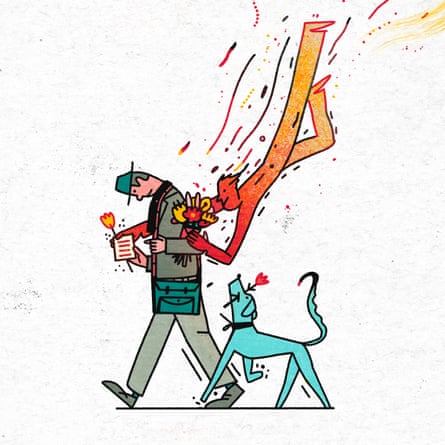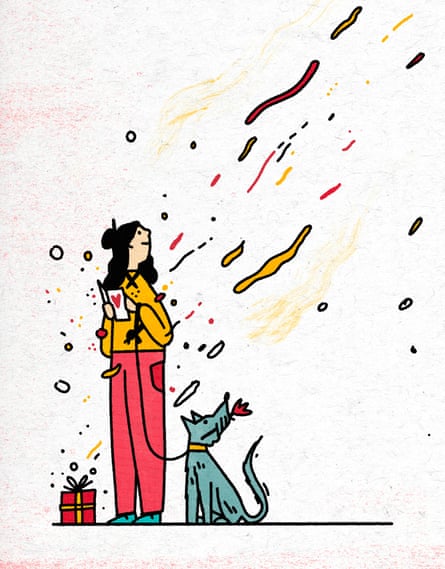A few weeks ago Marilyn Devonish buttonholed a stranger to compliment her outfit. It was a natty, colour-matched mauve jacket and pumps, but that wasn’t the point. Dashing home from a shopping trip, Devonish had noticed the woman’s harried look and slow, defeated gait.
“The weight of the world was on her shoulders, but she was dressed in such a lovely way and I just had to tell her that,” Devonish explains. But the subject of her attention was taken aback. “Just minutes earlier she had caught her reflection in a shop window and told herself how bad she looked.”
Devonish, 54, is a stealth “angel of good deeds” who suffered depression into her own early adulthood and sees it as her calling to bring some sunshine into fellow Britons’ days with a nice word about their shoes, hairstyle, jewellery or smile. Compliments bestowed, she melts back into the city streets, unnamed and untraceable.
Devonish, who also enjoys anonymously returning neighbours’ errant wheelie bins and holding doors open for strangers, says: “The point is not to be known for your good deeds – though, of course, I’m talking about them now – but to do a little something for someone else to make the world a slightly nicer place in that moment.” It’s a life philosophy which centres on radiating “human kindness and gratitude”.
Voluntary giving – be it a donation to charity or a kind word or deed – is one of the fastest and most reliable ways to improve a giver’s own mood and wellbeing. Many scientific papers have shown that it stimulates activity in brain regions associated with pleasure and reward, reduces physiological stress levels and leads, when giving becomes a habit, to long-term improvements in the life satisfaction of those who do good deeds.
In the past few years, though, a new breed of performative Samaritan has strode on to social media, toting wads of readies. They include Primenaz, a TikTok user who drops $20 bills at strangers’ feet and gifts his targets extra cash if they attempt to return them; and Sydney-based Tom, who films himself hovering behind unsuspecting shoppers at the till as he pays their checkout bills. It’s a broadcasted form of giving, which often features the street homeless as the unwitting recipients of money or gifts, that has attracted criticism for repositioning acts of kindness as a form of humanitarian drama.
However, a 2015 study found that we might want to refrain from becoming charitable braggards. The study looked into whether publicised or unpublicised donations to charitable causes lead to greater happiness and discovered that unpublicised gifts brought the bearer a 16% greater sense of happiness. The Beijing University researchers hypothesised that this boon comes from the fact that showy gifting makes a donor doubt their own motivations. Are we giving to others, for example, to enhance our reputation or to genuinely do good?
 View image in fullscreen Illustration: Laurie Avon
View image in fullscreen Illustration: Laurie Avon
Vic Wood finds TikTok’s loadsamoney random kindness actors “a bit crass, to say the least”. Wood, 43 and based in Sussex, subscribes to the “pay it forward” philosophy – a moment that has its roots in early 20th-century America. Payitforwardism imagines that the happy recipient of a good deed will be prompted to go on and perform a good deed for a third other and so on in a global chain of kindness. The term was coined by southern anti-racist reformer Lily Hardy Hammond in her 1916 memoir In the Garden of Delight, as a comment on the inter-generational devotion parent figures exhibit towards their children: “I never repaid Great Aunt Letitia’s love to her, any more than she repaid her mother’s,” she wrote. “You don’t pay love back, you pay it forward.”
For Wood, who routinely leaves money for fares taped to bus stops and bunches of flowers accompanied by heartwarming notes on park benches around her Sussex village, secrecy is both the key to being a good Samaritan, and much of its art.
“I would love to pay for someone’s shopping by tapping my card on the payment machine, but it’s soooo hard not to be caught in the act,” she says. For Wood’s 40th birthday she undertook to perform 40 anonymous good deeds in 40 days, encouraging her friends to do the same rather than buying her gifts.
“It was a lot of fun, but I really had to scratch my head to think of things,” she recalls. She bought multiple cups of coffee for people behind her in café queues and money was stuck to bus stops across the country by Wood’s friends to commemorate her birthday. “Even small gestures, I really recommend them,” she says. “I don’t know how to explain it other than it makes my heart feel really full.”
The power of anonymous good deeds has long been understood by many cultures. An Islamic hadīth has it that Allah will “grant shade” to “the man who gives in charity and conceals it to such an extent that the left hand does not know what the right has given.” Meanwhile, dana (giving) is an important part of Hindu’s dharma, or religious duty, and not necessarily in pursuit of a karmic quid pro quo. And the gospel according to Matthew schools Christians: “Do not your good works in public,” avoiding, it says “the trumpet fanfare”. Maimonides, a 12th-century Sephardic sage, taught that charity could be categorised into eight groupings, arranged by order of virtue. “Double blind” charity, in which neither the giver nor the receiver knows each other’s identity, occupies the second slot, beneath proffering others an ongoing source of material income, or lifelong vocation. Former Girl Guides and Boy Scouts might, for their part, recall Brown Owl’s injunctions to do a humble daily “good turn”.
One 46-year-old woman in northwest London I spoke to – who asked to be known only as Kate – sees herself as an example of the way the effects of a secret good deed can ripple through the years. In 2017, Kate posted on Twitter that she was scouring charity shops for gifts for her then eight-year-old son’s Christmas stocking. “I was just chatting offhand about how pleased I was that he was quite chilled and not into stuff like video game consoles as I had no cash that year,” she says. A few days later, Kate received a notification to visit the Brent Cross branch of John Lewis where a parcel was waiting for her. She arrived to find a large black bag containing a “massive” Lego set, a craft set, a luxury Christmas hamper and several bottles of wine. “It was a literal sack of gifts,” Kate recalls, “as if Santa had come to life.” In the intervening years, during which she learned her secret festive benefactor was one of her younger brother’s school friends, Kate has repaid the favour that “totally blew my mind as a skint single mum” by donating gifts to teenagers in her local authority’s care system.
“People always forget about older kids in these Christmas drives, so I wrap up boxes of Lynx and chocolates and put cash in them, as well as a note telling them how utterly cool they are,” she says. “The cash is frowned upon, by the way, but anyone who knows a teenager knows they have their own ideas about what they want to buy.”
I don’t know how to explain it, but it makes my heart feel really full
Cassandra Chapman studies the motivations behind charitable gift-giving at the University of Queensland Business School. She says we are driven to give “prosocially” (for the benefit of others or society) for complex reasons and often with a preference towards local recipients and causes (the charity adage “Give where you live”, echoing our instinctive preferences). “Some of us donate for reputation-seeking reasons,” Chapman explains. For many, though, it’s “for a mixture of motivations, including human empathy, sharing an identity with the beneficiary and having experienced suffering ourselves”.
Therapist Janey Holliday, 45, is based in Devon and uses anonymous good deeds as a therapeutic methodology with her group-coaching clients after taking to the habit herself 10 years ago as a means of overcoming her anxiety around money scarcity. Holliday, a solo mum of three, tends to focus on helping fellow mothers, pulling off the trick of secretly paying for their shopping at supermarket tills and regularly slipping cash into people’s pockets. She allocates 5% of her monthly income for this purpose. “I’ll always make sure I have some cash on me and I sit next to someone on a bench who I think might be in need and I just pop a note in there.”
These days, Holliday advises her coaching clients to boost their own sense of self-worth by performing small good deeds as a daily practice. “Time and again my clients say that they feel like their lives aren’t worthwhile,” she explains. The antidote to this sense of existential worthlessness, in Holliday’s view, is to become a good deed-doer – smiling at a glum-looking retail worker, for example, or complimenting someone’s shoes. “It creates so much more good in the world, and a much greater sense of joy, than the things many people think they should pursue – being super-successful, say, or having pots of money.”
Polly Arrowsmith, 55, says it was her late mother, an ethnic Sámi, who instilled in her a passion for performing random acts of kindness. “Where my mum grew up, in Finnish Lapland, it regularly plummets to -50C in winter,” she says. “In that sort of landscape if you don’t keep your promises to others and contribute to the general social good, people can die.” From childhood trips to the Arctic Circle, Arrowsmith recollects the warm culture of Sámi hospitality to strangers, where every household would be permanently on notice to roll out a spread of sweets, buns and jam.
 View image in fullscreen Illustration: Laurie Avon
View image in fullscreen Illustration: Laurie Avon
These days, Arrowsmith donates 10% of her income to causes, including London asylum-seeker charities, but most enjoys performing little-celebrated community good deeds, such as picking up strewn bags of dog poo from her neighbourhood pavements and scouring local supermarkets for trip hazards to nullify. “It might be a rolling tangerine or a packet of cheese or something like that.”
Like many of us (Britons’ charitable giving peaks in December), she is driven to give gifts at Christmas time, but in Arrowsmith’s case the impetus is personal. When she was seven, her mother, then battling alcoholism and living apart from the family in Finland, sent a box of Christmas gifts for her children, but it didn’t arrive. “We went to visit extended family that year and the other children all had these gifts and my sister and me had this solitary box of Milk Tray chocolates each,” she says. “I remember thinking how small it was and how it saddened me.”
Arrowsmith has given 2,500 Christmas presents anonymously over the past 10 years, using adverts on local shop noticeboards to appeal for recipients and offering choices of toiletries, jewellery or stationery. “It’s always something branded, so it doesn’t feel second rate.”
Compensating for those braggadocio TikTokers, social media also supports an ecosystem of anonymous beneficence. On the #payitforward reddit, “a community to share the good in the world”, users post gifting tips and share details of good deeds they’ve personally experienced. “If I have an extra £1, I leave it in the drink machine coin returns because I know how happy I am when I find money in those things,” says whatsthepoint1. TheHoundsOFLove, a student, notes: “In the library I slip notes of paper in the books with encouraging phrases on there, to remind those who may be feeling bad that they’re actually, like, amazing people.”
GoodGym, a group of people who run, walk and cycle to help community organisations and isolated older people, owes much to the Boy Scouting good-turn movement and is now active in 59 areas of the UK. Launched in 2017, the Book Fairies initiative encourages its 9,000 members to share books they love with anonymous strangers by leaving them in public places, often accompanied by a heartwarming dedication.
But for all the good intentions, anonymous good deed-doing can backfire. In 2021, a former Starbucks barista took to Twitter to bemoan the order confusion that arose from customers buying coffee for those behind them in the queue. “Instead of buying for the people behind you, who can probably afford their own stuff, tip the people making your drinks,” Hannah Wilson tutted.
Victoria Tretis, a financial consultant based in Nottingham, began leaving £1 coins on the railings of her local park after reading about the practice in a book on spiritualism and later graduated to sending anonymous gifts to family and friends, often of the wares of small local companies she was keen to support. In 2020, Tretis sent a box of chocolate brownies from a local baking business to her sister who, concerned they were poisoned as there was no stated sender, refused to eat them. “I had to confess all and talk her down as she was quite paranoid,” Tretis says, “although she did eventually scoff them.”
Early in her complimenting career, Devonish jumped into the sightline of a very smartly dressed man near to Great Portland Street tube in London. “I thought, ‘Oh my God he looks amazing with this three-piece suit, bright handkerchief and a dazzling tie, I just have to tell him!’” The beneficiary of Devonish’s effusive praise smiled graciously. “It turns out it was Ozwald Boateng,” Devonish said. “He knew he looked damn good.”
This article was amended on 6 December 2022 to clarify that Boateng did not introduce himself to Devonish’s, rather she recognised the fashion designer.






